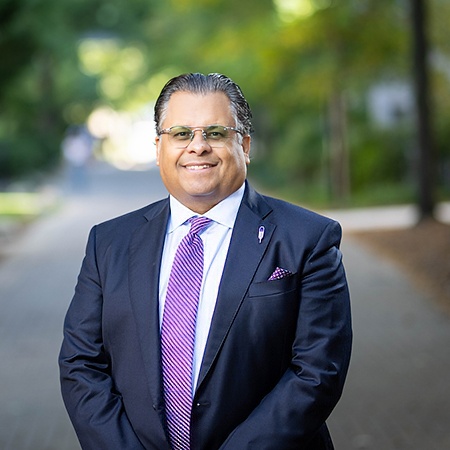Bryan McKinley Jones Brayboy
- Dean, Carlos Montezuma Professor of Education and Social Policy

Bryan McKinley Jones Brayboy (Lumbee) is dean of Northwestern University’s School of Education and Social Policy and the Carlos Montezuma Professor of Education and Social Policy.
His 25-year academic career has been characterized as an investment in people within higher education and the work they will do with its resources, well beyond the institution.
Brayboy is well known for his rich theoretical grounding and rigorous research methods, as well as his humor, humility, and genuine enthusiasm for his work.
His most influential scholarship is Tribal Critical Race Theory or TribalCrit, a groundbreaking framework he developed in 2005. TribalCrit is a framework to examine relationships among how race, power, and indigenous tribal sovereignty intersect.
In addition to TribalCrit, a globally cited classic in Indigenous studies, Brayboy’s research on Indigenous knowledge systems in schools helps explain how people learn, teach, and define themselves in relationship with powerful systems and structures.
Brayboy came to Northwestern from Arizona State University, where he was the President’s Professor in the School of Social Transformation and vice president of social advancement. He also served as senior advisor to the president, director of the Center for Indian Education, and co-editor of the Journal of American Indian Education.
From 2007 to 2012, he was visiting President’s Professor of Indigenous Education at the University of Alaska Fairbanks.
A member of the National Academy of Education and a fellow of the American Educational Research Association, Brayboy’s research focuses on intersecting knowledge systems that illuminate how institutional structures hinder and enable the success of underserved students, staff, and faculty. An anthropologist by training,
Brayboy is also concerned about how culture and cultural practices can support Indigenous students and communities.
He is the author or co-author of more than 100 scholarly documents, including nine edited or authored volumes, dozens of articles, book chapters, and policy briefs for the U.S. Department of Education, the National Science Foundation, and the National Academy of Sciences.
He has been a visiting and noted scholar in Canada, Australia, New Zealand, and Norway. His work has been supported by the U.S. Department of Education, the National Science Foundation, the Ford, Mellon, Kellogg, and Spencer Foundations, and several other private and public foundations and organizations.
Over the past 17 years, he and his team have helped prepare more than 165 Native teachers to work in American Indian communities and more than 24 American Indian PhDs.
Brayboy earned his bachelor’s degree at the University of North Carolina Chapel Hill and his master’s and PhD (with distinction) at the University of Pennsylvania. He is the father of two sons.
Vaught, S.E., Brayboy, B. McK. J., & Chin, J.A. (2022). The School Prison Trust. University of Minnesota Press.
Blackhawk, N., Brayboy, B. McK., J, Deloria, P.J., Ghilglione, L., Lomawaima, K.T., Medin, D., and Trahant, M. (2018). The American Indian: Obstacles and Opportunities. Daedulus.
Brayboy, B. McK. J. (2023). Through My Body and In My Heart: A Primer. Bank Street College Occasional Paper Series. Manuscript 1482.
Brayboy, B. McK. J. (2022). A New Day Must Begin: Tribal Nation Building and Higher Education. Journal of American Indian Education. 60(3): 95-113.
Brayboy, B.McK.J & Tachine, A.R. (2021). Myths, Erasure, and Violence: The Immoral Triad of the Morrill Act. NAIS. 8(1): 139-144.
Litts, B.K., Searle, K.A., Brayboy, B.McK.J, Kafai, Y.B. (2020). Computing for All?: Examining critical biases in computational tools for learning. British Journal of Educational Technology. https://doi.org/10.1111/bjet.13059
Brayboy, B. McK. J. & Chin, J.A. (2020). Being and Indigenousness: An Essay on the Development of Terrortory. Contexts. 19(3): 22-27.
Brayboy, B. McK. J. & Maughan, E. (2009). Indigenous Epistemologies and Teacher Education: The Story of the Bean. Harvard Educational Review. 79(1), 1-21.
Anderson, J. D. Bang, M. Brayboy, B.McK.J, de los Rios, C.V., Guitiérrez, K.D., Hicks, D., Ho, L, Lee, C.D., Lee, S. J., Santiago, M., Walker, V.D., Williamson-Lott, J.A. (2021). Agency and resilience in the face of challenge as civil action: Lessons learned across ethnic communities. In C.D. Lee, G. White, and D. Dong (Eds.) Educating for Civic Reasoning and Discourse. Washington DC: National Academy of Education.
Brayboy, B. McK. J. (2015). Views on Indigenous Leadership. In R. Minthorn & A. Chavez (Eds.). Indigenous Leadership in Higher Education (pp 49-58). New York: Routledge.